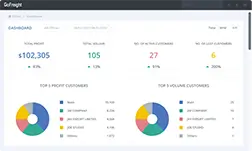Similar to all supply chain processes, the freight forwarding industry is undergoing great changes due to new technological advancements and inventions. With the influx of new logistics startups, it is understandable how it could be hard to keep up with all these changes. Forwarders may not even know which freight forwarding technology solutions to include in their tech stack.
In reality, all forwarders make use of technology in certain ways. No one operates with 100% manual processes. However, even if forwarders integrate some sort of digitalization workflows, such as email and Excel, inefficiencies may still inevitably arise. These inefficiencies represent opportunities and potential room for improvements. This is where freight forwarding technology comes into place and makes a significant difference to help enhance your forwarding business.
If forwarders persist to operate their daily forwarding tasks in traditional ways, they can expect to lose competitiveness and value. However, if they were to harness the power of new freight forwarding technologies and build new digital business models, according to Accenture, “they could significantly enhance their competitiveness, boosting earnings before interest and taxes (EBITDA) by approximately 13 percent annually.” The percentage of revenue growth may differ for each freight forwarding company, but utilizing freight forwarding technology will at the very least compensate for its integration costs. In this digital era, it may be essential to make use of freight forwarding technology to gain a competitive advantage and meet customer’s demands.
Below we will list the most important freight forwarding technologies you should consider integrating into your daily forwarding operations.
Embedded CRM Software
You may already be familiar with CRM software, as customer relationship management is significant in all industries. Freight forwarding technology needs to include CRM solutions as it helps forwarders to establish strong relationships with customer data management and trade partners in contacts.
Many of the enterprise solutions can be quite expensive, so seeking out specific feature-based options may be a viable alternative for a firm looking to enhance and grow its business with customer intelligence. Customer intelligence allows you to give good suggestions to your clients and surpass standard levels of service. Thereby, by differentiating your firm from competitors and providing high-quality services, the customer retention rate will only go up.
Online Documentation Management System
An all-in-one online document management system makes up an essential component of the tech stack that a modern freight forwarder must leverage. All document copies of different stages of logistics operations will be stored in digital form. Forwarders no longer need to handle paper documents and can eliminate manual processes.
As paperwork is transformed into digital format, this directly leads to digital freight settlement and streamlined workflow that shortens the payment cycle between forwarders and their clients. Making use of a documentation platform and giving your clients access to it will help you differentiate from your competitors.
Cloud-Based Freight Forwarding Software
Cloud-based freight forwarding software is a technology that can bring a lot of benefits to forwarders, but many have yet utilized the technology. Some of the reasons are concerns in pricing, and the time it takes to learn and deploy the software. People tend to only look at the short-term effect of integrating cloud-based freight forwarding software, but ignore the long-term rewards of using it.
Cloud-based freight forwarding software offers deep insights into all facets of the impacts of digital freight forwarding technology on your business. Firstly, analytics help managers to quickly identify business problems and make data-driven decisions. For example, managers can quickly spot shipments that are causing negative profit and try to find ways of improvements to increase overall revenue.
Furthermore, cloud-based analytics provides valuable data for machine learning and artificial intelligence that can promote robotics process automation (RPA). For instance, machine learning will be able to gain information on managing freight exceptions and automate manual processes. As a result, this will boost daily operational efficiency that will eventually lead to an increase in revenue.
The Most Important is Choosing the Right Technology For Your Company
Regardless of the progress of your company’s digital transformation, at the end of the day, the right freight forwarding technology should harmonize and streamline forwarding operations that will lead to a driving force of your company’s growth. This means the freight forwarding technology either allowed forwarders to secure more bookings, manage freight more effectively, and increase customer satisfaction.
The right freight forwarding technology allows you to automate manual processes, save time and work, give real-time insights, and provide more intelligence to keep the business moving forward.
Invest in the future of your company by integrating the right freight forwarding technology for your company. Leverage an all-in-one freight forwarding software, GoFreight, that helps in all areas of your business such as accounting, management, tracking, quotation, and operation. Request a personalized demo to see how GoFreight can maximize efficiency and productivity resulting in exponential business growth.







